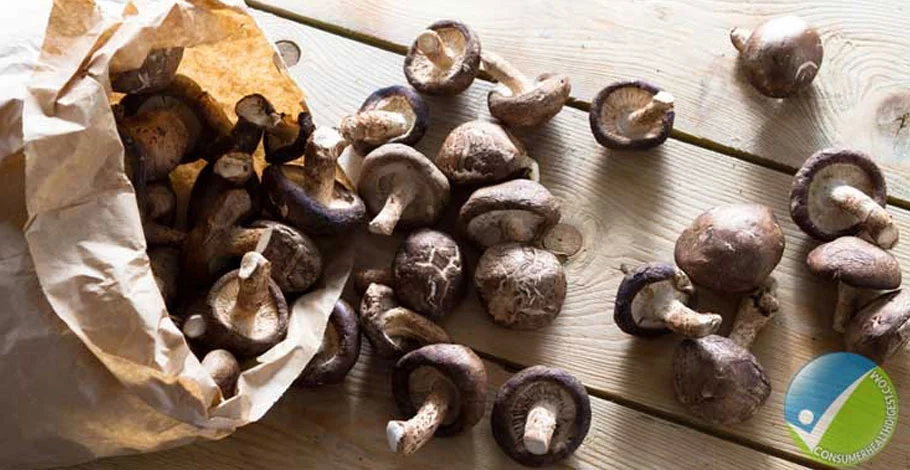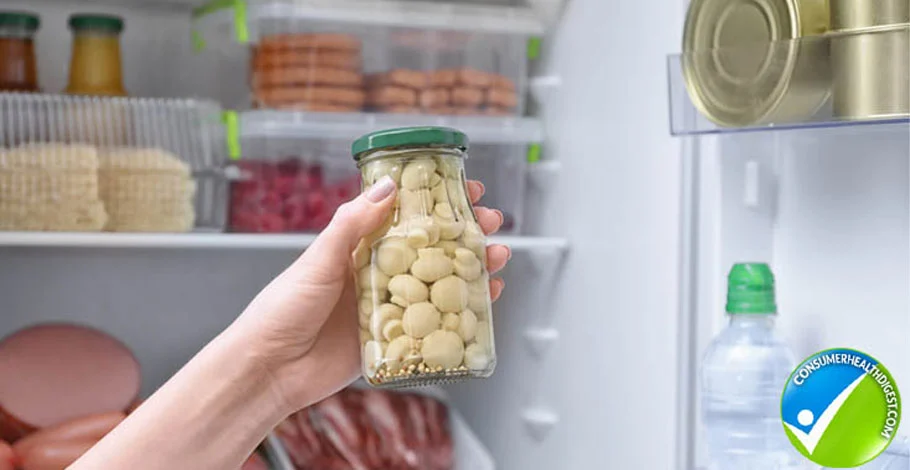In This Article
You were probably in a situation where you noticed a pack of mushrooms in your fridge that you completely forgot about, and you decided to throw them into the garbage.

That was a good decision.
Eating old mushrooms can lead to various medical problems and you can find out more about them below.
What are the Consequences of Eating Old Mushrooms?
Sometimes, eating old mushrooms can only give you an upset stomach as well as severe mushroom poisoning, where you will feel cramps and may or may not vomit.
However, in some cases, the health effects of old mushrooms are far more serious.
Botulism
This is a rare condition that is caused by bacteria called Clostridium botulinum.
There are several different forms of this condition, and foodborne botulism is one of them.
All types of botulism are fatal and they are considered a medical emergency.
According to information gathered by World Health Organization, botulinum toxins belong to the group of the most lethal substances in the world [1].
The bacteria that cause botulism can only grow in the absence of oxygen.
That is why this severe condition occurs after eating canned foods, foods that weren't stored properly, and low-acid preserved vegetables like mushrooms, spinach, beets, green beans, etc.
When you eat food that contains this toxin your nerve function will be disrupted which is followed by paralysis.
Symptoms of foodborne botulism are:
- Difficulty speaking or swallowing
- Paralysis
- Dry mouth
- Weakness in the both sides of the face
- Nausea, abdominal cramps, and vomiting
- Double or blurred vision
- Difficulty to breathe
- Drooping eyelids
Symptoms of botulism occur between 12 and 36 hours after eating foods that contain these toxins.
Botulism can be prevented by eating mushrooms that are fresh or preserved properly.
Don't eat mushrooms whose container smells bad or if it is bulging.
E. coli
E. coli or Escherichia coli are bacteria that live in our intestines. There are a lot of types of these bacteria and they are usually harmless [2].
However, there are some harmful strains that can lead to severe abdominal cramps and other complications.
The person is exposed to E. coli through consumption of contaminated food or water.
Mushrooms can become contaminated through unclean water.
You are at risk if you don't clean mushrooms properly and if you eat them either raw or undercooked, some mushrooms can be perfectly fine when they are “young” but as they get older they are also more harmful to your health.
Symptoms of E. coli infection occur three or four days after the person was exposed to this bacteria.
Also, you can become sick one day after the consumption or even the week after. The occurrence of E. coli symptoms varies from person to person, but they include:
- Abdominal cramps, pain, and tenderness
- Diarrhea that can go from mild and watery to severe and bloody
- Nausea
- Vomiting.
If you notice that diarrhea is persistent, severe, and bloody you should see your doctor immediately.
Salmonella
Salmonella is a common disease that affects a person's intestinal tract. People get infected after the consumption of contaminated food or water [3].
Salmonella-related to mushrooms can occur when the individual doesn't handle them properly during cooking, which gets even worse when mushrooms are old.
The incubation period after intake of contaminated food can range from several hours to two days.
Possible symptoms of salmonella include:
- Vomiting
- Nausea
- Fever
- Abdominal cramps
- Diarrhea
- Chills
- Headache
- Blood in the stool
When the person recovers from salmonella it can still take up to several months for their intestinal tract to return to normal.
Moreover, some varieties of salmonella bacteria can be deadly and they are more common in developing countries.
How to Know When Mushrooms are Gone Bad and Not Safe to Eat?
Here are some signs that you definitely shouldn't eat those old mushrooms from your fridge [4]:
- They Are Slimy – fresh and properly stored mushrooms aren't slimy. When you notice that mushrooms in your fridge have gotten slimy it is the first sign for you to throw them into the trash. At this point, they aren't really dangerous, but they already lost most of their good values and it would be a good idea to throw them and buy fresh ones. Additionally, they aren't as tasty as fresh mushrooms.
- They Have Wrinkles – in some cases, mushrooms who have been sitting in your fridge for too long don't get slimy at first, but instead, the first sign that they are old is the appearance of wrinkles. Also, with the occurrence of wrinkles, they tend to dry out.
- Mushrooms Get Darker and Dark Spots Appear

Mushrooms Get Darker and Dark Spots Appear
The appearance of dark spots on mushrooms is one of the most obvious signs that they are too old. It would be ideal for you to check up on the mushrooms in your fridge from time to time and look for dark spots. If you notice their color is getting darker, you will know they are really too old and you shouldn't eat them.
- They Have Been in Your Fridge for More Than Two Weeks - Generally, after two weeks they are considered too old and not safe to eat. However, people usually make a mistake by looking at the symptoms at this point. Two weeks is a long period for mushrooms and regardless of the signs of whether they are old or not, you shouldn't risk it by eating them.
- They Develop an Odor – fresh mushrooms don't have a strong and unpleasant odor. If you can notice this type of odor in the mushrooms from your fridge, that means they are really not safe to eat.
What is Mushrooms' Shelf Life?
Vegetables, fruits, etc. don't have a very long shelf life. Additionally, the longer they are left uneaten the lower their nutritional value is.
It is always best to eat mushrooms, and other products when they are fresh because that is usually when they taste the best and your body is enriched with all the nutrients they possess.
Mushrooms don't have a very long shelf life and they tend to spoil pretty fast. You will notice the spoilage by the symptoms listed above. “Expiration date” for mushrooms is:
- Fresh whole mushrooms – 7 to 10 days
- Fresh sliced mushrooms – 5 to 7 days
- Cooked mushrooms – 7 – 10 days
How Long are Mushrooms Safe to Eat When they are Prepared in a Meal?
In generally, mushrooms prepared in some meal last as the quickest expiring ingredient that you used for that meal.
You should also avoid eating meals that spent a longer period of time in your fridge as they can disturb your stomach as well.
How to Store Mushrooms Properly?
Although mushrooms don't have a very long “life”, they can last longer if you store them properly.
The most common reason for spoiled and old mushrooms in your fridge is the fact they weren't preserved adequately.
In order to prolong their life and save your health, this is what you should do:
- Let Them Breathe - Mushrooms should be stored in a way that they get some air but without drying out too much. The best ways to do so is by putting mushrooms into the paper bag and leave it in the fridge.
- Paper Towels And Plastic Bags - Another way to prevent mushrooms from spoiling too soon is by storing them in the plastic bag that was lined with paper towels. The purpose of paper towels is to attract moisture. If you want to use this method of storing mushrooms then make sure you change paper towels regularly.
- Keep Them In The Sealed Wrap - One of the best and most common ways for preserving mushrooms is by keeping them in the sealed wrap they came in.
- Freeze Mushrooms - It is difficult to freeze raw mushrooms and if you want to preserve them with this method, you should first cook, blanch, steam, or sauté them. When you want to freeze mushrooms, use air-tight bags instead of some containers.

Freeze Mushrooms
REMEMBER: it would be ideal to eat mushrooms when they are fresh.
Also, before you decide to include them into your meal you should wash them thoroughly.
Moreover, do not buy mushrooms if they weren't stored properly in the store or supermarket, or if they kept them at the room temperature.
Causes of Mushroom Spoilage
We have already established that mushrooms can get old pretty fast. However, some factors can speed up this process.
For example:
- Bacterial contamination due to improper storage during transportation
- If the compost used in fields is already contaminated.
Mushroom Poisoning - Conclusion
If you suddenly remembered there was a pack of mushrooms in your fridge and you don't even know when you bought it, instead of including it into some meal you should throw it out.
Eating old mushrooms can lead to severe mushroom food poisoning, cause some medical complications, and disrupt your intestinal tract, which will take a few months to recover.
You should always strive to eat fresh mushrooms, store them properly, and wash them thoroughly.
4 Sources
We review published medical research in respected scientific journals to arrive at our conclusions about a product or health topic. This ensures the highest standard of scientific accuracy.
[2] E. Coli: https://www.webmd.com/food-recipes/food-poisoning/what-is-e-coli#1
[3] Salmonella infection: https://www.mayoclinic.org/diseases-conditions/botulism/symptoms-causes/syc-20370262
[4] How to Tell When Mushrooms Are Bad: 5 Tell-Tale Signs: https://delishably.com/vegetable-dishes/How_Do_You_Know_When_Mushrooms_Go_Bad







 This article changed my life!
This article changed my life! This article was informative.
This article was informative. I have a medical question.
I have a medical question.
 This article contains incorrect information.
This article contains incorrect information. This article doesn’t have the information I’m looking for.
This article doesn’t have the information I’m looking for.